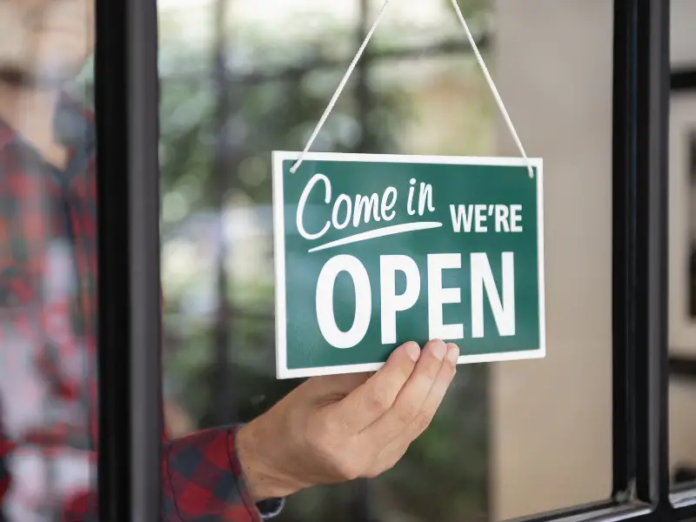For a small retailer, an empty store can quickly lead to an empty bank account. The key to overcoming this financial challenge lies in understanding how to get more customers and boost foot traffic. In this article, we will explore 50 effective tips on how to get more customers, providing valuable insights and actionable steps to enhance your store’s visibility, engage your target audience, and increase sales.
Relatedly, here’s a word from Tyson Zahner, who discusses marketing strategies that allow you to dominate Social media:
50 Effective Tips on How to Get More Customers to Your Store
From sprucing up your store sign to starting a referral program, here are 50 ideas you can try that will lure more customers to your store:
- Spruce up your store sign. Make sure your sign is in good repair (lights working, paint fresh), clearly visible, and easy to read from a distance. (Here are some other tips to improve a store’s curb appeal.)
- Announce what your business does. Customers driving by should be able to tell immediately what your business sells. If your signage doesn’t clearly communicate whether you sell children’s clothes or pet supplies, they won’t bother to come in and find out.
- Announce you’re open. Have you ever driven by a dimly-lit shop with closed doors and wondered if it was open or not? Keep your door open and lights on. Put up an “Open” sign with your hours—even roll out an actual welcome mat. Anything to signal to passersby you’re open for business.
- Indicate where to park. If your store has parking that’s not immediately visible (like behind the store) a sign in the front window saying “Free Parking in Rear” will help encourage visitors who might not want to search for street parking
- Provide bike racks or storage. Does a lot of your target market ride bikes? Depending on city ordinances, you may be able to get a bike rack outside your store.
- Use mobile signs. Sign-twirlers dressed as hotdogs reek of desperation, but a sandwich board with a great offer gets passersby to stop, look and shop. Add a clever saying and they’ll probably share it on social media, too.
- Promote perks via signage. Do you have free Wi-Fi? Do you offer layaway? Did you just get a new shipment of a wildly popular product that’s hard to find? Alert passersby with a sign in the window.
- Hold an in-store event. A fashion show, book signing, author reading, art exhibit or even live music are all ways to get more people in the door.
- Hold a contest. Promote it online, via email and on social media, but require coming into the store to enter.
- Use in-store social media. Set up a “selfie wall” with a backdrop people can take pictures in front of. Change it out from time to time and put your store hashtag on it. Give customers discounts for posting to social media and tagging your store.
- Use Google Local Inventory ads. When customers search online for products, these ads let them know you have what they want in stock. Learn how to use Google Local Inventory ads.
- Start a local merchants association. Get together with nearby businesses and brainstorm ways to market your area, such as pooling advertising dollars or holding monthly events.
- Cross-promote with individual businesses. Put your flyers or coupons in nearby businesses’ locations, and vice versa. Offer shoppers a discount at Store A if they show a receipt from Restaurant B.
- Lure customers inside by displaying some outside. Set up a tempting sidewalk sale can entice customers to enter the store.
- Attract a crowd with your window display. Creative displays shouldn’t be limited to the holiday season. Update your store window every few weeks to give shoppers something to see year-round.
- Give out free samples along with a discount coupon for a larger purchase of the item.
- Offer a free gift with purchase. This can be enough to entice passersby in the door.
- Place pet water bowls outside. As strolling dog owners pause to let Fido sip, they’ll check out your merchandise.
- Hold a class. Teach people how to do something relevant to your business, like cooking lessons for a cookware store or makeup tutorials for a boutique.
- Do a product demonstration. Show customers how to use a popular product you sell.
- Play music in your store. The right music can tell shoppers at first listen exactly who your target customers are—and get them inside.
- Piggyback off the popularity of nearby businesses. Benefit from popular nearby businesses, such as movie theaters, restaurants, bowling venues, arcades, or non-competing stores, by handing out samples, flyers or coupons near these stores or buying in-mall advertising near these locations.
- Sell gift cards. Users have to come back in to your store if they want to use the cards—and they’re likely to buy more than the value of the card.
- Make sure employees look busy and friendly. Employees who look bored, engrossed in their phones, or ready to pounce on the first customer who comes in the door scare people away.
- If you sell online, offer a buy-online, pickup in-store (BOPIS) option. Customers almost always browse once they’re in the door, and frequently end up buying more than they came in for.
- Accept in-store returns of online purchases. When customers make a return, always ask if they’d like to look around first—you might make a sale or at least turn a return into an exchange.
- Use Facebook and Instagram ads to drive store visits. You can actually create ads that have the goal to drive store traffic. These show up when shoppers are near your location and offer coupons to redeem in-store.
- Optimize your business for local search. Manage your local directory listings, especially Google, to ensure they’re up to date and complete with your hours of operation, phone number, link to your website, enticing photos of your store, and keywords customers use when they search for you. Learn the steps to local search optimization.
- Create a pop-up shop inside your store. Invite a complementary business or a popular brand you sell to do a pop-up in your store. This will attract their customers, whom you can then ask to sign up for your marketing emails.
- Use email marketing to get customers into your store. Send special offers or coupons that can only be redeemed in-store.
- Set up a photo booth. You can rent a photo booth for a week and encourage customers to take photos, share them on social media and tag your store. Reward customers who do so with a discount on their purchase.
- Hold a flash sale. A limited-time, surprise sale can get customers in the door. Offer a two-for-one special, 30 percent off everything in the store or whatever makes sense for your business. Send emails and text messages or post on social media about your sale to build urgency.
- Make it mobile. If your business already uses mobile marketing apps that reach out to people based on their location, put them to work. Customers who are already out and about are more likely to be tempted to come into your store.
- Offer refreshments. On a cold, snowy or rainy day, free coffee, tea, hot chocolate and other treats can entice frozen shoppers to stop by and warm up. On a hot day, stock up on lemonade, cold water and iced tea. Keep a supply of these items in your stockroom so you can serve refreshments at a moment’s notice. Promote them on social media and via your other marketing methods.
- Provide a place to rest. Window shoppers might become real shoppers if their companions have a place to sit and rest while they browse. Put a few chairs or an ottoman in your store.
- Entertain children. Entice parents into your store (and get them to spend more time there) by providing entertainment for their children. Set up a little area in the store with a play table, toys and books. Enlist an employee to read stories to the kids or play games with them. Meanwhile, offer the parents discounts and the chance to get a break from their kids while they shop.
- Reward them. Does your store already have a loyalty rewards program? Great. Let customers know you’re offering double or triple rewards points today. The extra incentive might be all they need to get out the door and into your store.
- Market to loyalty program members. As members build up loyalty points, send emails to remind them when they’ve reached a certain level and encourage them to come in.
- Send targeted offers to loyalty program members who haven’t visited your store in a while to win them back.
- Reward your most active loyalty program members with VIP experiences. For example, offer a preview of your newest products, a free makeover, a sale after-hours just for them, or other special treatment to make them feel valued.
- Spruce up your façade. Make sure your store looks appealing from the outside; clean the windows, keep the sidewalks swept and pick up trash.
- Get customers to sign up for mobile messages and you can text special offers during slow times.
- Review your website SEO strategy to make sure it’s pulling in customers. You may need to update keywords or create new content to attract online searchers.
- Use Google AdWords weather targeting to advertise weather-related products. For instance, if a rainstorm is in the forecast, advertise compact umbrellas or rain hats. Find out more about weather targeting on Google; Facebook and Instagram offer a similar feature.
- Use local social media influencers to attract customers. A social media influencer your target customers care about can help drive customers to your store. Find out how to work with influencers.
- Offer services related to your products, such as free repairs or annual maintenance. This will give your customers a reason to come back.
- Use direct mail. With so much email in your customers’ in-boxes, physical mail can really stand out—just use it sparingly. A postcard a few times a year with a special offer will get attention.
- Send birthday greetings to customers with a special birthday offer or a free gift for visiting the store.
- Follow up after a purchase. Contact customers to see if they’re happy with the purchase and use the opportunity to suggest related products they might like.
- Start a referral program. Offer your customers rewards for every new customer they refer. Ask customers who are new to your store how they heard about you.
And a bonus tip—Measure the results of your marketing efforts. Track which of the tactics above work best and keep using them.
Next Steps: Nurturing New Customers
Here is a concise table of the steps you can reference before getting too deep into the list that follows:
| # | Step | Description |
|---|---|---|
| 1 | Exceptional Customer Service | Provide outstanding customer service to leave a lasting impression on your patrons. Ensure that your staff is friendly, knowledgeable, and attentive to customer needs. |
| 2 | Loyalty Programs | Implement loyalty programs or reward systems to encourage repeat visits and foster customer loyalty. Offer discounts, exclusive offers, or special perks for returning customers. |
| 3 | Personalized Marketing | Utilize customer data to create personalized marketing campaigns. Tailor promotions and recommendations based on individual preferences and purchase history. |
| 4 | Gather Feedback | Regularly seek feedback from your customers to understand their experience better. Use surveys or social media to collect valuable insights and make necessary improvements. |
| 5 | Social Media Engagement | Maintain an active presence on social media platforms to keep customers engaged and informed about new products, promotions, or events. |
| 6 | Follow-Up Communications | Send follow-up emails or messages after a customer’s purchase to express gratitude and ensure their satisfaction. It also provides an opportunity to cross-sell or upsell. |
| 7 | Build an Online Community | Create an online community around your brand where customers can share their experiences and interact with each other. Encourage user-generated content to strengthen your brand’s credibility. |
| 8 | Monitor Analytics | Keep a close eye on various analytics, such as foot traffic patterns, sales trends, and customer behavior. Analyzing data can help you make data-driven decisions to optimize your store’s performance. |
Once you start attracting new customers to your store using the tips and techniques mentioned above, it’s crucial to focus on retaining them and nurturing long-term relationships. Here are some essential steps to follow:
1. Exceptional Customer Service
Provide outstanding customer service to leave a lasting impression on your patrons. Ensure that your staff is friendly, knowledgeable, and attentive to customer needs.
2. Loyalty Programs
Implement loyalty programs or reward systems to encourage repeat visits and foster customer loyalty. Offer discounts, exclusive offers, or special perks for returning customers.
3. Personalized Marketing
Utilize customer data to create personalized marketing campaigns. Tailor promotions and recommendations based on individual preferences and purchase history.
4. Gather Feedback
Regularly seek feedback from your customers to understand their experience better. Use surveys or social media to collect valuable insights and make necessary improvements.
5. Social Media Engagement
Maintain an active presence on social media platforms to keep customers engaged and informed about new products, promotions, or events.
6. Follow-Up Communications
Send follow-up emails or messages after a customer’s purchase to express gratitude and ensure their satisfaction. It also provides an opportunity to cross-sell or upsell.
7. Build an Online Community
Create an online community around your brand where customers can share their experiences and interact with each other. Encourage user-generated content to strengthen your brand’s credibility.
8. Monitor Analytics
Keep a close eye on various analytics, such as foot traffic patterns, sales trends, and customer behavior. Analyzing data can help you make data-driven decisions to optimize your store’s performance.
By implementing these next steps, you can foster customer loyalty, drive repeat business, and establish a thriving retail store with a loyal and satisfied customer base. Remember, the journey doesn’t end with attracting new customers; it’s about nurturing and building strong relationships to ensure sustainable success.
Image: Depositphotos.com























